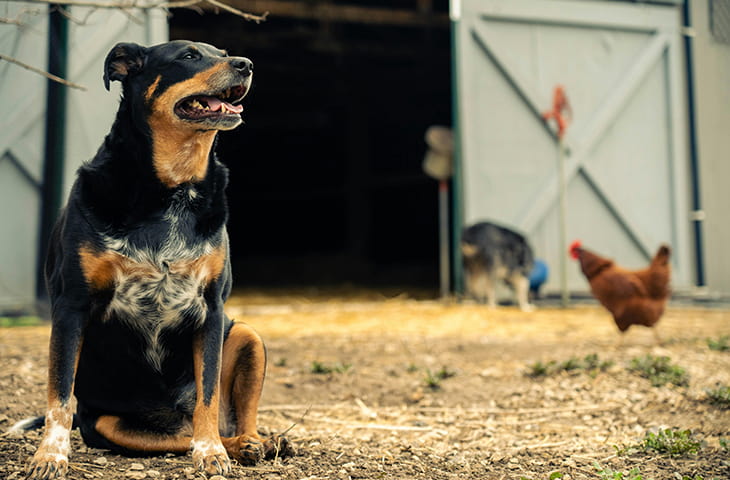Your Older Pet's Special Needs And How To Meet Them

12.27 BW Nonlead
https://www.barkandwhiskers.com/2015-10-07-nl-senior-pet-wellness-checkups/
https://www.barkandwhiskers.com/p/1c09338a-2bdb-4990-86cc-eb55cdb9d7ac/
By Dr. Becker
I talk a lot here at Mercola Healthy Pets about the importance of regular wellness checkups for animal companions. As a proactive wellness practitioner, I'm all about preventing disease whenever possible, and helping people help their beloved furry family members live long, active, and healthy lives.
Ideally, I like to see my healthy patients twice a year, and those with chronic conditions more often.
Other patients I want to see 2 or even 3 times a year are senior and geriatric pets. After the age of 8 (younger for some large and all giant breed dogs), your dog's or cat's wellness and nutritional needs can require fine-tuning every 4 to 6 months. In older pets especially, it's important to review weight, muscle tone, joint range of motion, diet, supplement protocol, and exercise habits at least semi-annually.
Why Senior Wellness Checkups Are Important
The senior pet wellness screen is an excellent tool for early detection of changes in your dog's or cat's health so that treatment, including appropriate lifestyle modifications, can begin immediately. Regular wellness screens allow your veterinarian to compare current test results with past results to check for changes that may need further investigation.
A huge benefit of early detection of disease is that treatments are often more effective and less costly, and the quality of your pet's life can be maintained. I know from experience that committed guardians would rather keep their pets in good health than try to return them to health after disease strikes.
The Essentials of a Senior Wellness Checkup
Senior wellness testing involves several elements, including but not limited to:
- Physical examination. A physical exam is a critically important part of the senior wellness checkup. All body systems are assessed to check for any abnormalities. It is during the physical exam that I check a pet's weight, muscle tone, and joint range of motion, measuring the animal's current status against past exam findings as well as norms for the breed, age, and gender.
- Blood chemistry tests. Blood chemistries are blood serum tests that evaluate your pet's organ function, electrolyte status, hormone levels, and more. Blood chemistry results are helpful in diagnosing diseases such as diabetes, and liver and kidney failure.
- Complete blood count (CBC). The CBC gives information on hydration status, anemia, infection, the blood's clotting ability, and the ability of your pet's immune system to respond. It provides a detailed look at the blood itself and reveals problems such as anemia or the presence of infection.
- Urinalysis. The urinalysis is used to assess the overall health of your pet's urinary tract, including the kidneys and bladder, and to check for other health indicators such as glucose regulation and liver function.
A complete urinalysis measures the function of the nephrons in the kidneys and gives information about your pet's metabolic and fluid status. The test is also used to evaluate substances in the urine that might indicate an underlying disease process.
Thyroid screen. The thyroid screen helps diagnose thyroid disease, which is an especially common ailment in older cats and dogs. T4 (thyroxine) is a thyroid hormone.Decreased levels of thyroid hormones often signal hypothyroidism in dogs, while high levels indicate hyperthyroidism, commonly diagnosed in cats. Performing a complete thyroid panel is important, as measuring just a T4 may not reveal an underlying thyroid problem.
Glaucoma screen. Glaucoma testing measures the pressure in each of your pet's eyes quickly and painlessly. This is an important test because undetected glaucoma can lead to permanent blindness. Retinal exam. This eye test is used to check for evidence of problems with the retinas of the eyes such as bleeding, degeneration, inflammation, or detachment. Blood pressure measurement. This test checks your pet for hypertension (high blood pressure). Like humans, pets with hypertension are at significantly increased risk for kidney problems, heart disease, blindness, and other complications. X-rays. Radiographs (x-rays) can also be helpful as part of a senior pet wellness checkup. Chest x-rays, for example, can reveal certain things about the heart and lungs. Abdominal x-rays can be used to assess the liver and kidneys.Since many vet clinics don't have digital x-ray equipment and their x-rays still involve radiation, I don't typically order them unless the results of other tests indicate a potential problem requiring further investigation.
Additional Testing for Seniors
If you live in an area where ticks are a problem, I also recommend an annual or even twice-yearly SNAP 4Dx Plus or Accuplex4 test for senior dogs to check for tick-borne illnesses, including heartworm, Lyme disease, ehrlichiosis, and anaplasmosis.
In certain situations I may recommend FeLV/FIV testing for senior cats to check for the presence of the feline leukemia and feline immunodeficiency viruses. These viruses can suppress your kitty's immune system and lead to secondary infections, anemia, and even cancer.
Diet and Supplement Review
During senior wellness exams, I also conduct a diet and supplement review for each pet. Good nutrition is the foundation of good health, so I want to know what type of diet your pet is eating and whether there have been any changes in appetite or signs of food sensitivities.
Contrary to what many pet guardians and veterinarians believe, studies show pets need more protein as they age to maintain lean muscle mass and good organ and immune function. I recommend that healthy pets of all ages eat a balanced, fresh, and whole food diet, preferably raw, made with organic, non-GMO ingredients. Some senior pets may need a diet that restricts phosphorus or sodium intake.
During senior wellness checkups I also review each patient's supplement protocol and make suggestions based on the most recent diagnostic test results, my physical exam, and any concerns the pet's guardian brings up.
I typically recommend digestive enzymes and probiotics for all older pets. If a dog or cat needs additional fiber in the diet, I recommend supplementation with natural sources of fiber such as psyllium husk powder, ground dark green leafy vegetables, coconut fiber, or canned 100 percent pumpkin.
I always recommend an omega-3 fatty acid supplement such as krill oil (my favorite), another fish body oil (but not cod liver oil), or Algal DHA for pets who are allergic to seafood.
Most aging pets can benefit from joint and antioxidant supplements such as glucosamine sulfate with MSM, cetyl myristoleate, eggshell membrane, perna mussel (green lipped clam), homeopathic Rhus Tox, ubiquinol, supergreen foods, and natural anti-inflammatory formulas (herbs such as turmeric and yucca, proteolytic enzymes, SOD, and nutraceuticals).
Exercise for Aging Pets
During senior wellness exams I'm also interested in knowing what kind of exercise my older patients are getting and how often.
All pets, regardless of age, benefit from physical activity. Senior and geriatric dogs and cats need daily exercise to maintain good health and a resilient frame. Older pets can't exercise with the same intensity as younger animals, but they still need age-appropriate physical activity.
There are three types of strengthening exercises that can also be of tremendous help to aging canine and feline bodies:
- Passive range-of-motion (PROM) exercises can benefit both incapacitated and physically healthy pets
- Balance and proprioception (spatial orientation and movement) exercises help older pets remain flexible while also encouraging improved balance and physical stability
- Targeted strengthening exercises are designed to work the big muscle groups that help with standing, walking, and running
For older pets I also recommend massage, chiropractic, acupuncture, and/or activities like water exercise to help maintain muscle tone and balance, and alleviate joint pain.
So Have You Made That Appointment Yet?
I hope I've persuaded you of the importance of regular wellness checkups for your older pet. There is no benefit, but considerable risk in taking a "no news is good news" approach with an aging dog's or cat's health.
A thorough senior wellness checkup should evaluate your four-legged family member from nose to tail, and give you the tools you need to help your aging pet enjoy vibrant good health throughout his or her golden years.
Related Articles:
 How to Perform an at Home Wellness Exam on Your Pet
How to Perform an at Home Wellness Exam on Your Pet The 3 Stages of Your Senior Cat’s Life, and What to Expect of Each
The 3 Stages of Your Senior Cat’s Life, and What to Expect of Each 8 Out of 10 Pet Owners Didn't Recognize These Signs of Illness - Will You?
8 Out of 10 Pet Owners Didn't Recognize These Signs of Illness - Will You?

